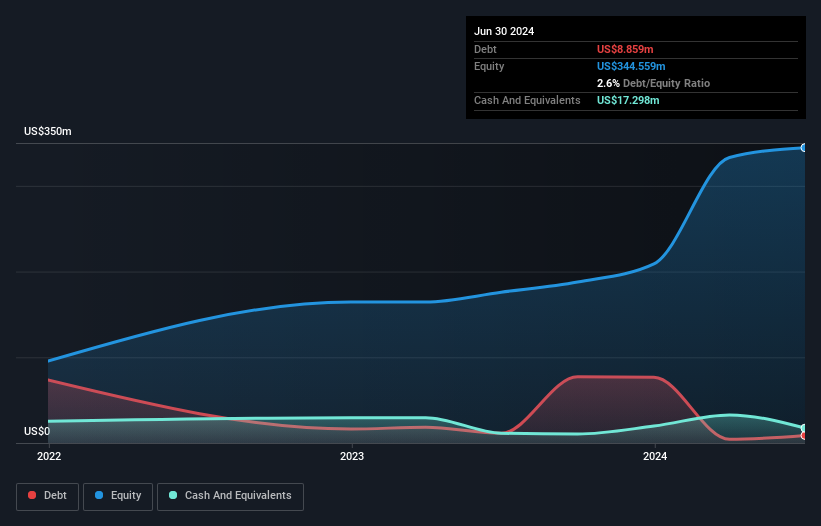- United States
- /
- Consumer Durables
- /
- NYSE:SDHC
We Think Smith Douglas Homes (NYSE:SDHC) Can Stay On Top Of Its Debt

Warren Buffett famously said, 'Volatility is far from synonymous with risk.' So it might be obvious that you need to consider debt, when you think about how risky any given stock is, because too much debt can sink a company. We can see that Smith Douglas Homes Corp. (NYSE:SDHC) does use debt in its business. But is this debt a concern to shareholders?
When Is Debt Dangerous?
Debt is a tool to help businesses grow, but if a business is incapable of paying off its lenders, then it exists at their mercy. Part and parcel of capitalism is the process of 'creative destruction' where failed businesses are mercilessly liquidated by their bankers. However, a more frequent (but still costly) occurrence is where a company must issue shares at bargain-basement prices, permanently diluting shareholders, just to shore up its balance sheet. By replacing dilution, though, debt can be an extremely good tool for businesses that need capital to invest in growth at high rates of return. The first step when considering a company's debt levels is to consider its cash and debt together.
View our latest analysis for Smith Douglas Homes
How Much Debt Does Smith Douglas Homes Carry?
As you can see below, Smith Douglas Homes had US$8.86m of debt at June 2024, down from US$11.3m a year prior. But it also has US$17.3m in cash to offset that, meaning it has US$8.44m net cash.

A Look At Smith Douglas Homes' Liabilities
We can see from the most recent balance sheet that Smith Douglas Homes had liabilities of US$45.0m falling due within a year, and liabilities of US$39.7m due beyond that. On the other hand, it had cash of US$17.3m and US$100.0k worth of receivables due within a year. So its liabilities total US$67.3m more than the combination of its cash and short-term receivables.
Of course, Smith Douglas Homes has a market capitalization of US$1.81b, so these liabilities are probably manageable. Having said that, it's clear that we should continue to monitor its balance sheet, lest it change for the worse. Despite its noteworthy liabilities, Smith Douglas Homes boasts net cash, so it's fair to say it does not have a heavy debt load!
On the other hand, Smith Douglas Homes's EBIT dived 18%, over the last year. If that rate of decline in earnings continues, the company could find itself in a tight spot. The balance sheet is clearly the area to focus on when you are analysing debt. But ultimately the future profitability of the business will decide if Smith Douglas Homes can strengthen its balance sheet over time. So if you want to see what the professionals think, you might find this free report on analyst profit forecasts to be interesting.
Finally, while the tax-man may adore accounting profits, lenders only accept cold hard cash. Smith Douglas Homes may have net cash on the balance sheet, but it is still interesting to look at how well the business converts its earnings before interest and tax (EBIT) to free cash flow, because that will influence both its need for, and its capacity to manage debt. Over the most recent three years, Smith Douglas Homes recorded free cash flow worth 70% of its EBIT, which is around normal, given free cash flow excludes interest and tax. This cold hard cash means it can reduce its debt when it wants to.
Summing Up
While it is always sensible to look at a company's total liabilities, it is very reassuring that Smith Douglas Homes has US$8.44m in net cash. And it impressed us with free cash flow of US$28m, being 70% of its EBIT. So we are not troubled with Smith Douglas Homes's debt use. There's no doubt that we learn most about debt from the balance sheet. However, not all investment risk resides within the balance sheet - far from it. For example Smith Douglas Homes has 2 warning signs (and 1 which is significant) we think you should know about.
When all is said and done, sometimes its easier to focus on companies that don't even need debt. Readers can access a list of growth stocks with zero net debt 100% free, right now.
If you're looking to trade Smith Douglas Homes, open an account with the lowest-cost platform trusted by professionals, Interactive Brokers.
With clients in over 200 countries and territories, and access to 160 markets, IBKR lets you trade stocks, options, futures, forex, bonds and funds from a single integrated account.
Enjoy no hidden fees, no account minimums, and FX conversion rates as low as 0.03%, far better than what most brokers offer.
Sponsored ContentNew: Manage All Your Stock Portfolios in One Place
We've created the ultimate portfolio companion for stock investors, and it's free.
• Connect an unlimited number of Portfolios and see your total in one currency
• Be alerted to new Warning Signs or Risks via email or mobile
• Track the Fair Value of your stocks
Have feedback on this article? Concerned about the content? Get in touch with us directly. Alternatively, email editorial-team (at) simplywallst.com.
This article by Simply Wall St is general in nature. We provide commentary based on historical data and analyst forecasts only using an unbiased methodology and our articles are not intended to be financial advice. It does not constitute a recommendation to buy or sell any stock, and does not take account of your objectives, or your financial situation. We aim to bring you long-term focused analysis driven by fundamental data. Note that our analysis may not factor in the latest price-sensitive company announcements or qualitative material. Simply Wall St has no position in any stocks mentioned.
About NYSE:SDHC
Smith Douglas Homes
Designs, constructs, and sale of single-family homes in the southeastern United States.
Excellent balance sheet and slightly overvalued.
Market Insights
Community Narratives



